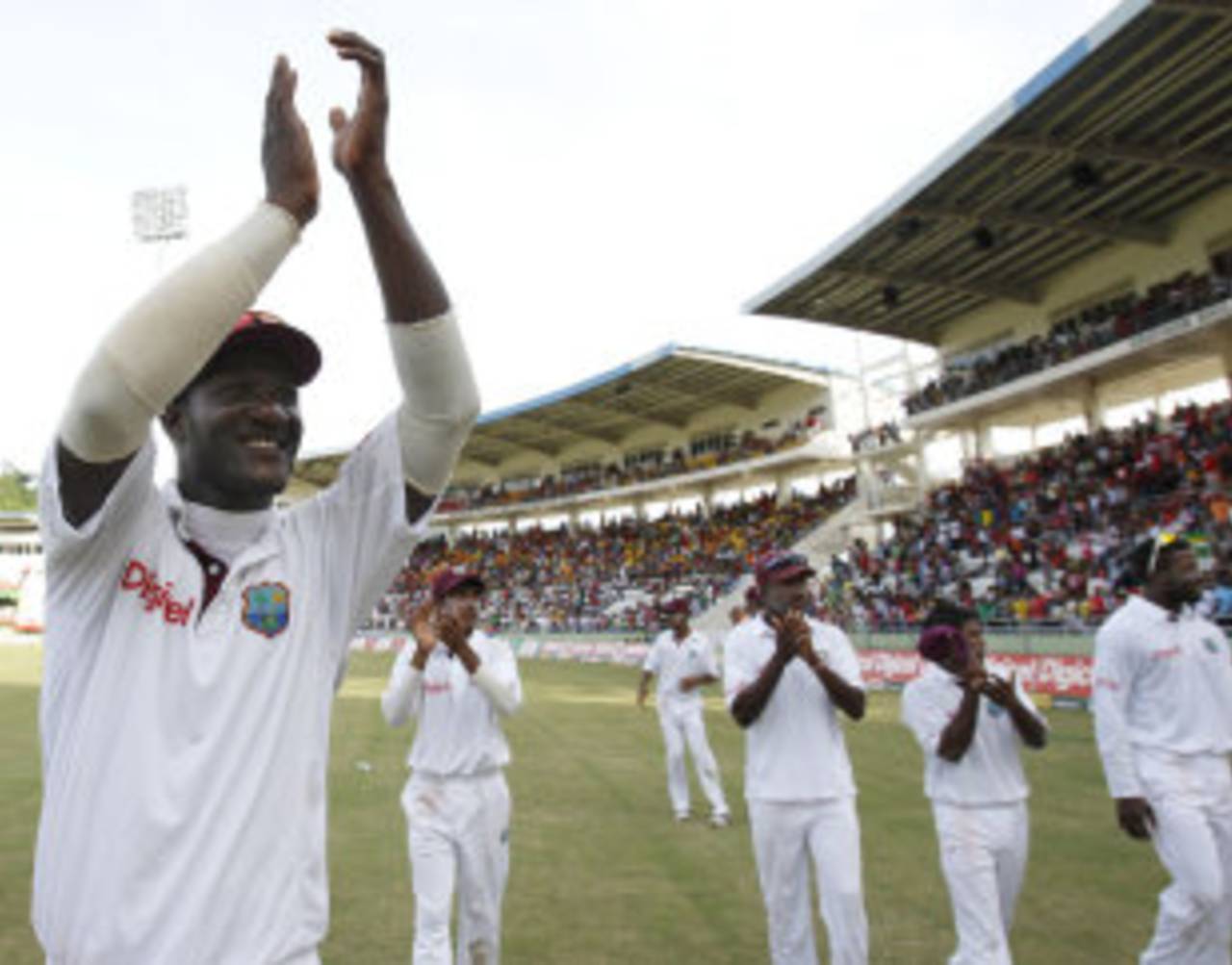Oh no, not again: the great misses continue
In 1978, seven years after the Bangladesh War, India and Pakistan resumed cricketing ties in a three-Test series played in Pakistan
Samir Chopra
Feb 25, 2013, 11:22 PM

Should West Indies have been allowed a draw in Dominica? • Associated Press
In 1978, seven years after the Bangladesh War, India and Pakistan resumed cricketing ties in a three-Test series played in Pakistan. After playing out a draw in the first Test at Faisalabad, drearily in conformance with the cricketing history of the two sides, Pakistan beat India in the Lahore Test, thanks to Zaheer Abbas' magnificent 235, and a very enterprising run-chase on the fifth day in which Pakistan scored their runs at 6.19 an over, and galloped home with 8.2 overs still left in the day. This was heartening enough for fans of Test cricket, but it was the third Test that really showcased positive Test cricket at its best.
Sitting on a 1-0 lead against their archrivals, in a series fraught with emotional and political significance, Pakistan chased down a victory target of 164 runs in a maximum of 100 minutes. At times, the asking-rate had mounted to seven an over. No matter; the Pakistan batsmen, especially Asif Iqbal and Javed Miandad scrambled singles like a pair of amphetamine-crazed ravers, drove the Indian fielders batty, and then finally, thanks to Imran Khan's assault on Bishen Bedi's bowling late in the game, Pakistan scampered home with an over to spare.
That was 33 years ago. Well before Twenty20 cricket had been conceptualised, and only three years after one-day cricket had staged its first World Cup. Just like India going into the Dominica Test that concluded on Sunday, Pakistan enjoyed a 1-0 lead in 1978. They could very well have shut up shop, strolled over to the victory dais, picked up their thousand-rupee cheque (I'm guessing that's what the prize money must have been in those days), and posed for the post-series victory shots. Mushtaq Mohammad could have given us some pablum about not being disappointed, about how Sunil Gavaskar had held them up on the final day, how the Karachi pitch was a bit slow and not conducive to penetrative bowling and so on.
Instead, Pakistan chased down the runs. There was a match to be played, a contest to be engaged in. Pakistan were not the world's No. 1 Test team; India was not one of the world's weakest teams (they might have been one of the world's worst fielding sides though). Rather, what made Pakistan go for victory, I suspect, was how that lot, Majid, Zaheer, Asif, Javed, Mushtaq, just played the game.
We should keep this in mind when we think about what transpired in Dominica on Sunday. The Test was called off by mutual agreement between both captains with India needing 86 runs from 15 overs after having been set a target of 180 in 47 overs. Abhinav Mukund's first-ball duck might have put a damper on things, but M Vijay and Rahul Dravid had at least scored at three an over, and Suresh Raina had sensibly been sent up the order. But the Indian balloon deflated rapidly after his departure and, in one of the most-bizarre abandonments of a Test match I've ever seen in my life, India walked off with 90 deliveries still left.
There are some Indian fans out there, including me, who are still surprised that India agreed to call off the 1979 Oval Test with one ball left and nine required to win. They, and I, will certainly never understand the shutting up of shop against West Indies on Sunday.
To be a true champion it is not enough that one sit on top of a numerical ladder of rankings and points; it is necessary the putative champion show the desire and the ability to respond to challenges, to find a way to transcend limitations and rise to the top of the game. This Indian Test team is certainly one of the most consistent in Indian cricket history and MS Dhoni is certainly one of its shrewdest captains. But the Dominica result shows that there is a long way to go before it can attain the status of champions. For the spirit of Melbourne 1986 - when India scored at 2.36 runs an over while chasing 126 on the final day and had bad weather force a draw - still lives on apparently, and the desire and wherewithal to force a win when not everything is in ones' favour still seems missing.
As for Test cricket, in such dire times, you need better guardians.
Samir Chopra lives in Brooklyn and teaches Philosophy at the City University of New York. He tweets here